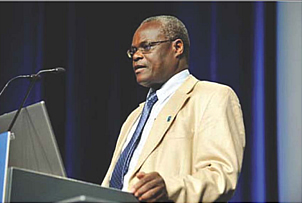AIDS experts: Decriminalization needed to combat AIDS
Colin Stewart is a 45-year journalism veteran. He is the…
One of several quick recaps of news related to this week’s International AIDS Conference in Washington, D.C.

“If we are to take advantage of the huge possibilities that the science is now affording us in tackling the epidemic, we urgently need the most vulnerable populations at the table, but at the same time we need governments to be brought to account for policies that are criminalizing sexual preference and people´s behaviors rather than dealing with these issue as public health concerns,” said Dr. Elly Katabira, AIDS 2012 International Chair and President of the International AIDS Society (IAS).
That’s from the conference’s official press release for today:
Thursday, 26 July 2012 (Washington, D.C., United States)— At a time when the potential of new HIV prevention technologies and treatment as prevention to turn the tide of the HIV/AIDS epidemic is greater than at any other time in the past three decades, experts are calling for a sweeping reassessment at all levels of decision-making to turn around the disproportionately high rates of HIV prevalence in those groups most vulnerable to infection, delegates heard today at the XIX International AIDS Conference (AIDS 2012) taking place in Washington, D.C. this week.
Men who have sex with men (MSM), injecting drug users (IDUs), transgender people and sex workers continue to experience denial, stigma, prejudice, discrimination and tokenism that have led to both a resurgence and exacerbation of HIV epidemics in those populations in parts of the globe.
“If we are to take advantage of the huge possibilities that the science is now affording us in tackling the epidemic, we urgently need the most vulnerable populations at the table, but at the same time we need governments to be brought to account for policies that are criminalizing sexual preference and people´s behaviours rather than dealing with these issue as public health concerns,” said Dr. Elly Katabira, AIDS 2012 International Chair and President of the International AIDS Society (IAS).
“However, we also need to do better at our end. Outreach programmes to these vulnerable groups need to be scaled up, to be made more effective and to more adequately reflect the demographic of local epidemics and not placed in the too-hard basket.”
“We´ve seen over three decades that evidence-based approaches to public health have been the most effective instruments in driving down new infection in high-risk groups,“ said Dr. Diane Havlir, AIDS 2012 U.S. Co-Chair and Professor of Medicine at the University of California, San Francisco. “Needle exchange programmes have saved millions of lives in many countries the world over, legal reform of sex work in some countries has reduced exposure to infection and the decriminalization of homosexuality is strongly linked to effective outreach in that community.”
Related articles
- Fatal flaw in official anti-AIDS declaration (76crimes.com)
- Doctors, Tutu, Clinton appeal for LGBT rights in AIDS fight (76crimes.com)
- Africa: Decriminalizing AIDS (salon.com)

